

Gut bacteria found to reverse autism-related social behavior. Published today in Cell, the study found that the addition of the bacteria Lactobacillusreuteri, which is commonly found in human breast milk, increased the likelihood that previously antisocial mice would interact with each other.
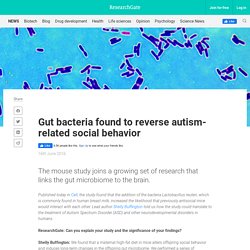
Lead author Shelly Buffington told us how the study could translate to the treatment of Autism Spectrum Disorder (ASD) and other neurodevelopmental disorders in humans. A commensal microbe reverses autism spectrum social deficits in mice. What is already known on this topicAutism spectrum disorder (ASD) is a range of neurodevelopmental disorders whose symptoms include problems in social interaction, language difficulties, and repetitive behaviors.
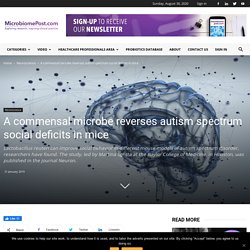
At the moment, there is no cure for the core symptoms of ASD, but studies have shown that the commensal species Lactobacillus reuteri can reverse social deficits in one of the animal models of ASD.What this research addsThe researchers further investigated the role of L. reuteri in ASD mouse models and found that this microbe alone could lead to specific changes in the brain that reverse social deficits in three of these models.ConclusionsThe results provide new insight into how L. reuteri influences brain function in mice. The authors say that L. reuteri could be a promising, non-invasive approach to help treat ASD-related social behavior. L. reuteri can rescue social deficits in three different ASD models ASD could be of genetic, environmental, or unknown origin. Can autism be treated with a simple microbial-based therapy? - TMC News.
Researchers at Baylor College of Medicine have successfully reversed social deficits associated with autism spectrum disorders (ASD) in mice through a bacterial-based therapy.
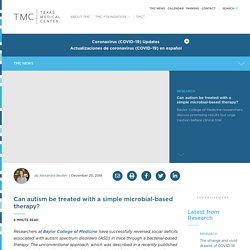
The unconventional approach, which was described in a recently published paper in the journal Neuron, has widespread potential for the development of noninvasive therapies for autism and suggests a future in which the microbiome plays a major role in the treatment of neurological conditions. TMC News Senior Writer Alexandra Becker sat down with the paper’s authors, Mauro Costa-Mattioli, Ph.D., professor and Cullen Foundation Endowed Chair of Neuroscience and director of the Memory and Brain Research Center at Baylor College of Medicine, and first author Martina Sgritta, Ph.D., a postdoctoral associate in the Costa-Mattioli lab, to discuss their findings. Martina Sgritta, Ph.D., a postdoctoral associate in the Costa-Mattioli lab at Baylor College of Medicine. Costa-Mattioli: The connection is not shocking. Make your own Lactobacillus reuteri yogurt.
Gastrointestinal deregulation linked with autism. A commensal microbe reverses autism spectrum social deficits in mice. Single species of gut bacteria can reverse autism-related social behavior in mice. To begin, the researchers fed approximately 60 female mice a high-fat diet that was the rough equivalent of consistently eating fast food multiple times a day.
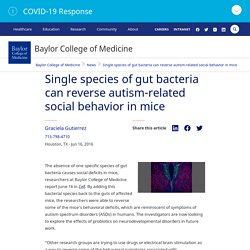
They bred the mice and waited for them to bear young. The offspring stayed with their mother for three weeks and were then weaned onto a normal diet. After a month, these offspring showed behavioral deficits, such as spending less time in contact with their peers and not initiating interactions. Role of Lactobacillus reuteri in Human Health and Diseases. Introduction Probiotics are defined as “live microorganisms which, when administered in adequate amounts, confer a health benefit on the host” by the World Health Organization.
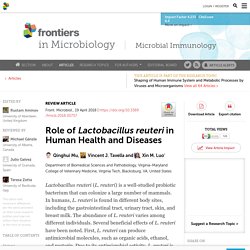
While the idea to use probiotics for health benefits is not new, the interest has significantly increased in recent years (Islam, 2016). This may be due, in part, to the increase in antibiotic resistance particularly in the treatment of diseases in the gastrointestinal (GI) system, as well as an increasing desire by the public for natural health promotants. Those probiotic microorganisms that have been shown to have beneficial properties include Lactobacillus spp., Bifidobacterium spp., Saccharomyces boulardii, Propionibacterium spp., Streptococcus spp., Bacillus spp., Enterococcus spp., and some specific strains of Escherichia coli (Kechagia et al., 2013). Gut microorganisms act together to exacerbate inflammation in spinal cords. 1.Cosorich, I. et al.
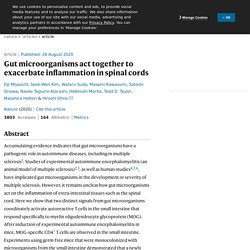
High frequency of intestinal TH17 cells correlates with microbiota alterations and disease activity in multiple sclerosis. Sci. Adv. 3, e1700492 (2017).ADS Article Google Scholar 2.Yokote, H. et al. Probiotics can ‘potentially’ cure autism-like disorders — study. Texas researchers have managed to reverse autism-like neurological disorders in mice by adding just a single gut bacteria to their diet, but they still don’t know if human brains can be helped in the same way.
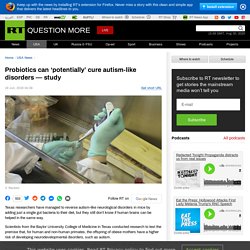
Scientists from the Baylor University College of Medicine in Texas conducted research to test the premise that, for human and non-human primates, the offspring of obese mothers have a higher risk of developing neurodevelopmental disorders, such as autism. To investigate the link between maternal obesity and behavioral deficits, the researchers tested 60 female mice separated into two groups. For eight weeks, some mice were fed a high-fat diet, while the others received just a regular diet. They were then paired with male mice that had been on a regular diet all of their lives, to produce offspring. The researchers focused on the newborns’ behavior. Oxytocin and L. reuteri: Turning the clock back 10 or 20 years.
I’ve been talking an awful lot about our Lactobacillus reuteri yogurt lately.
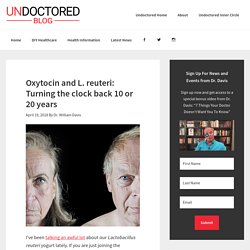
If you are just joining the discussion, see this last post for a summary, brief rationale, and how we make our yogurt using a method to boost bacterial counts (CFUs). I’ve been talking about it because it is one of the most exciting ideas to have come along in a while that you can put to work with visible and perceptible results within days to weeks. It even provides additional benefits over and above the extravagant health and age-reversing benefits obtained through the Undoctored Wild, Naked, Unwashed program and the Wheat Belly efforts.
L. reuteri ATCC PTA 6475 & L. reuteri DSM 17938. BioGaia Gastrus – BioGaia. BioGaia Gastrus is a combination of the well-researched probiotic strain Lactobacillus reuteri 17938 (Lactobacillus reuteri Protectis) and the anti-inflammatory strain Lactobacillus reuteri ATCC PTA 6475. Buy BioGaia Gastrus Probiotics - HappyTummy.
Lactobacillus reuteri yogurt.